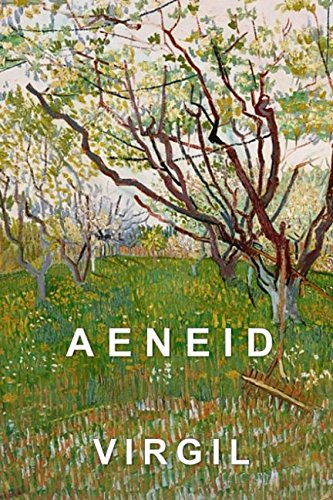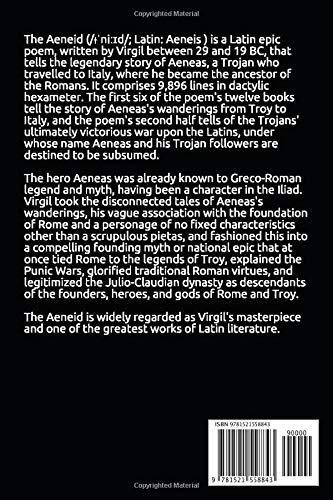


Full description not available
A**B
It's Okay.
This is the Dryden translation without the frills. It's about what you'd expect.
M**N
Good quality, speedy delivery.
Came speedy and was very high quality. Thank you!
M**.
The Great Trojan Escape
When talking about canonized epics written in dead languages, you're talking about the quality of translation. Robert Fitzgerald's translation of Virgil's THE AENEID is a text that sings with expert cadence and rhythm. I marvel at the precision and time it must have taken Fitzgerald to cobble this together. I found myself underlining passages throughout my reading. Lines such as "Harsh repose oppressed his eyes, a sleep of iron, and in eternal night they closed" have a timelessness that reaches over centuries.The story itself is the postscript to the Trojan War, a sort of Life After Troy follow-up. The Trojans have been driven from Asia and are seeking a new homeland that providence has told them awaits in Italy among the Latium. It's the Roman Empire's origin story - replete with demigods, he-man bravery, and Olympic favoritism. (Reading in the twenty-first century, you can't help but crack a smile, knowing that Aeneas' forbears would one day, centuries later, find themselves returned to Turkey and surrounded by hostile forces as the Roman Empire makes its final stand). THE AENEID doesn't stray too far from the Homeric formula: fate vs. choice, gluttonous feasts, lots of battle porn, and a smattering of hysterical women.Reading THE AENEID, one can see its influence on later work. It calls to mind Shakespeare, Milton, and, yes, Dante. The beauty of the metaphors and the blockbuster pacing simply work. We're told reading Virgil is vital to understanding Western Literature. Robert Fitzgerald's translation shows us exactly why that is.
M**D
Great story
I liked the genealogy and maps, the cover faded a bit tho
N**L
Continues to Inspire
Brutal and beautiful. What an epic poem Virgil crafted. I can see why Dante, in a later era, essentially worshipped this poem and its poet and used much of it in his own epic masterpiece of poetry.I found much of Homer in this poem too, in the journey and divine hardships endured by the hero Aeneas. It reminded me heavily of Odysseus’ quest to return to Ithaca from fallen Troy. Aeneas’ quest was a similar one, beginning in the concluding fires of the same battle, and both were forced to endure the spiteful wrath of deities, but Virgil’s Aeneas and Homer’s Odysseus were on opposite sides in the Fall of Troy.I could write about Virgil’s “The Aeneid” for some time I think, so I’ll end the review here. This work was an inspiration, vividly descriptive, horrifyingly savage and violent, mythic and epic. It’ll stay with my always, much like the poetry of Dante and Homer.
F**G
The Lofty Language of Ancient Epic
Translations of Ancient Greek and Latin poetry into English poetry vary widely, and so it is important to find one that will work for you and to go on to read several others. Unfortunately, reviews for several translations get grouped together on a product's page. Some of the ones you read here are for Fitzgerald's translation, some for Fagles, and many for ones that aren't named. Here, I am reviewing the translation by Robert Fitzgerald. I love this book. Fitzgerald is a fine poet, and his translations capture the lofty language of ancient epic in modern English extremely well. However, as someone who has taught the Iliad, the Odyssey, and the Aeneid in high-school English classes for over 15 years, I wouldn't suggest starting with this translation. Stanley Lombardo's version serves that purpose much better (and is excellent in its own right). Translations by Sarah Ruden and Robert Fagles aren't far behind. I would recommend starting with Lombardo's and then moving onto Fitzgerald's. You may want to use the "Look Inside" feature on their Amazon pages to read a sample of each and judge for yourself before ordering. High-school students might need to start by reading a shorter version, as it is easy for them (and others) to get frustrated by the length of ancient epic and to get lost in language that is not clear to them. Then they're primed for reading a translation of the Aeneid.--Frank HeringAuthor of Virgil's Aeneid Retold for Young Adults
N**E
the best translation for the general reader
Translation is always a difficult art, but if I ever taught the "Aeneid" in translation in a civ course (in my experience thus far, I've taught it only in the original), I believe I would use Fitzgerald's version. Of modern translations of classical epic, I loathe Fagles' work the most: he is too colloquial by far, his meter is so weak it feels like prose, and he lacks majesty. Fitzgerald, on the other hand, avoids all of these faults, and in addition expands the text as necessary to gloss it for readers unfamiliar with the context. (Fitzgerald does the same thing in his translations of Greek drama.) All of this gives the right character to the piece for one who is unlearned in the original (hence, why it would make a good translation for a civ class)--but Fitzgerald is also a pleasure to read for his own merits.
Trustpilot
2 months ago
1 week ago